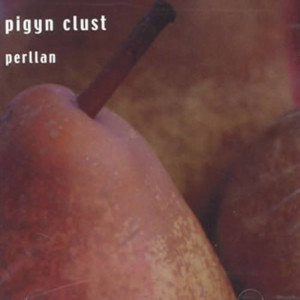 This is an exquisite album. It’s difficult to decide whether the instrumentals or the vocals are more compelling — rest assured that both are lovely, and the combination is at once exciting and restrained. This disc will appeal both to fans of Celtic and early music, who will probably find it difficult to remove from the CD player.
This is an exquisite album. It’s difficult to decide whether the instrumentals or the vocals are more compelling — rest assured that both are lovely, and the combination is at once exciting and restrained. This disc will appeal both to fans of Celtic and early music, who will probably find it difficult to remove from the CD player.
I first heard Pigyn Clust on The Rough Guide to Wales, and was delighted when they sent this disc (twice, as my first copy was the victim of a purse snatching). But I digress…
Pigyn Clust are Ffion Haf, whose tender soprano instantly sets this group apart, Cass Meurig on fiddle and crwth, Idris Morris Jones on fiddle, Endaf ap Ieuan on guitar and bouzouki, and Win Williams on guitar. Together they produce a very clean yet dark sound that conjures up time spent in drafty old rooms with roaring fires, listening to music played by angels who’ve just happened to drop by.
The fiddles are particularly effective together, often used as a rhythmic backdrop, with the guitar filling the middle range, and Haf carrying the melody, such as on “Hwyrgan,” a lament for someone lost at sea. Pigyn Clust extend their sense of spare elegance to their lyrics, which are reminiscent of haiku, full of images suggesting emotion, excluding the superfluous.
My heart is leaden, my tears salt
Rocks wreck hopes
Gull’s lament shivers my soul
The night closes in
Still as the sea
Another song, “Gwenllian’s Cradlesong,” about a 13th century Welsh princess kidnapped by Edward I and confined to an abbey her entire life, rhymes in both languages.
If you could know, young child so sweet,
How close this love is to deceit
And how these two beguiling eyes
Are tired of all these twisted lies
But here within my warm caress
I’ll shelter you from all distress.
All the songs are sung in Welsh, with portions of the lyrics printed in both languages, text printed against an outline of ripe fruit that heightens the sensual images contained in the songs. The melodies are also lovely, tender and wistful, with a great balance between voice and instruments.
Perllan also includes some nice instrumental sets that achieve their power through expressive playing rather than loud and fast flourishes. “Tôn Fechan,” contains three tunes that combine the typical aesthetic of Celtic dance music with the sensibilities of a much older era — so typical of Welsh traditional music. The opening track, “Perllan (Orchard)” is also stunning. It’s a long instrumental introduction composed mostly of a fiddle duet followed by the addition of voice and guitar in a song that celebrates the sensuality of love — wonderful!
What makes Pigyn Clust stand out is their exquisite sense of timing, playing that enables them to pack spare arrangements with emotion and drama, and their good fortune in having such a great vocalist in Has. If you like the finer things in life and in Celtic music, this one’s for you.
[Kim Bates]
(Fflach: tradd, 2001)
